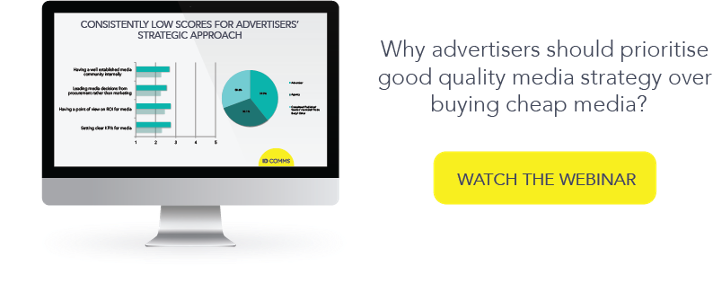As Sam Cooke said: “Its been a long time coming but I know, a change gonna come.”
This year, we expect many advertisers and media agencies will significantly change the way they work internally and with each other. Perhaps it's been a long time coming, but get ready here it comes.
At ID Comms, we are privileged to work closely with many of the world’s leading advertisers, supporting each of them on their individual journeys to take greater control of their media strategy and improve the performance of their media investments.
The biggest single change in media this year will be a wholesale recognition that media budget is an investment that drives a business outcome. It's not a cost to be managed downwards, it's a powerful lever for growth. This impacts in three major areas, all inevitably interrelated:
Advertisers
Firstly, advertisers will create internal change in the way that media is viewed and managed. That will occur with a transformation of the internal narrative around media, rather than being a cost to be managed downwards it will become an investment in growth and media budgets will be engineered to drive a business outcome.
Advertisers understand now that media is not something you delegate away to external agencies. It needs proper executive oversight and governance and treated like any other major company investment. Marketers will continue to take more control of media decisions, define a clear vision and ambition for media investment and set proper KPIs for media performance which focus investment against driving business outcomes.
This is a huge change, particularly among those advertisers who have neglected their media budgets for years. The new attitude will see media redefined as a powerful lever for growth and a critical part of marketing success.
Change at an advertiser level will also come in the relationship between marketing and procurement. As the internal narrative changes then this will also drive far closer alignment between marketing and procurement stakeholders.
In turn, this will allow the media agency being seen more as a strategic partner in success rather than a commodity supplier.
Agencies
Secondly, media agencies will also face dramatic change, driven largely by the change in brief and scope issue by marketers. This will be most apparent in the big media pitches of 2017, which often set the tone for the whole industry by pressurising the media agency networks.
The more strategic pitch briefs – rather than the clumsy, race-to-the-bottom e-auctions – will define a new blueprint for the media agency model, asking them to engineer their resources more specifically around marketers’ new requirements.
Agencies will have to respond by being more open to defining partner relationships with advertisers, aligning to the same KPIs, working to performance-based payment models and offering greater financial transparency.
As it gathers pace, this process will have a dramatic impact on the shape of media agencies, perhaps shifting away from the being ‘buying giants’ leveraging scale to secure cheap pricing, to be more like objective, strategic consultants.
To make this transformation believable, however, media agencies are going to have to be very transparent about their business model, as its impossible to be wholly objective and neutral if your income is derived largely from the buying of certain media.
Accountability
Finally, we anticipate big changes in how media investment is held accountable. This is the thread that holds this all together, it starts with defining the business outcome you expect media to contribute to.
With greater accountability there comes increased responsibility all down the chain to properly measure the impact of media and account for the value that it creates.
This year, 2017 could be the year when metrics for media become more rationalised, with more standardisation and consistency.
Such accountability will link the changes in advertisers with the changes in media agencies, allowing both parties to become more accountable to the CEO, CMO, CPO and permitting them to demonstrate the business outcome.
In turn, agencies will have to become more accountable for the value they create and in 2017 we will finally see a lot more performance based remuneration models applied to media agencies, incentivising them to deliver growth for their clients, rather than just discounts.
Such changes in the way that agencies and advertiser marketing departments are assessed will, over time, result in the media market moving from one focused on cost, price, discount and auditing to one of value, growth and performance.
The only certainty for 2017 will be that nothing will be like it was before. Making that transformation a reality requires advertisers to take the lead, to change themselves and to demand that agencies also transformation.
Without change all the frustrations that advertisers felt with media in 2016 will continue. With it there is scope for a paradigm shift that allows media to become a business growth driver that is accountable, allowing agencies to earn the rewards that smart media thinking justifies.
As Sam said "It's been a long, a long time coming. But I know a change gonna come, oh yes it will"






COMMENTS